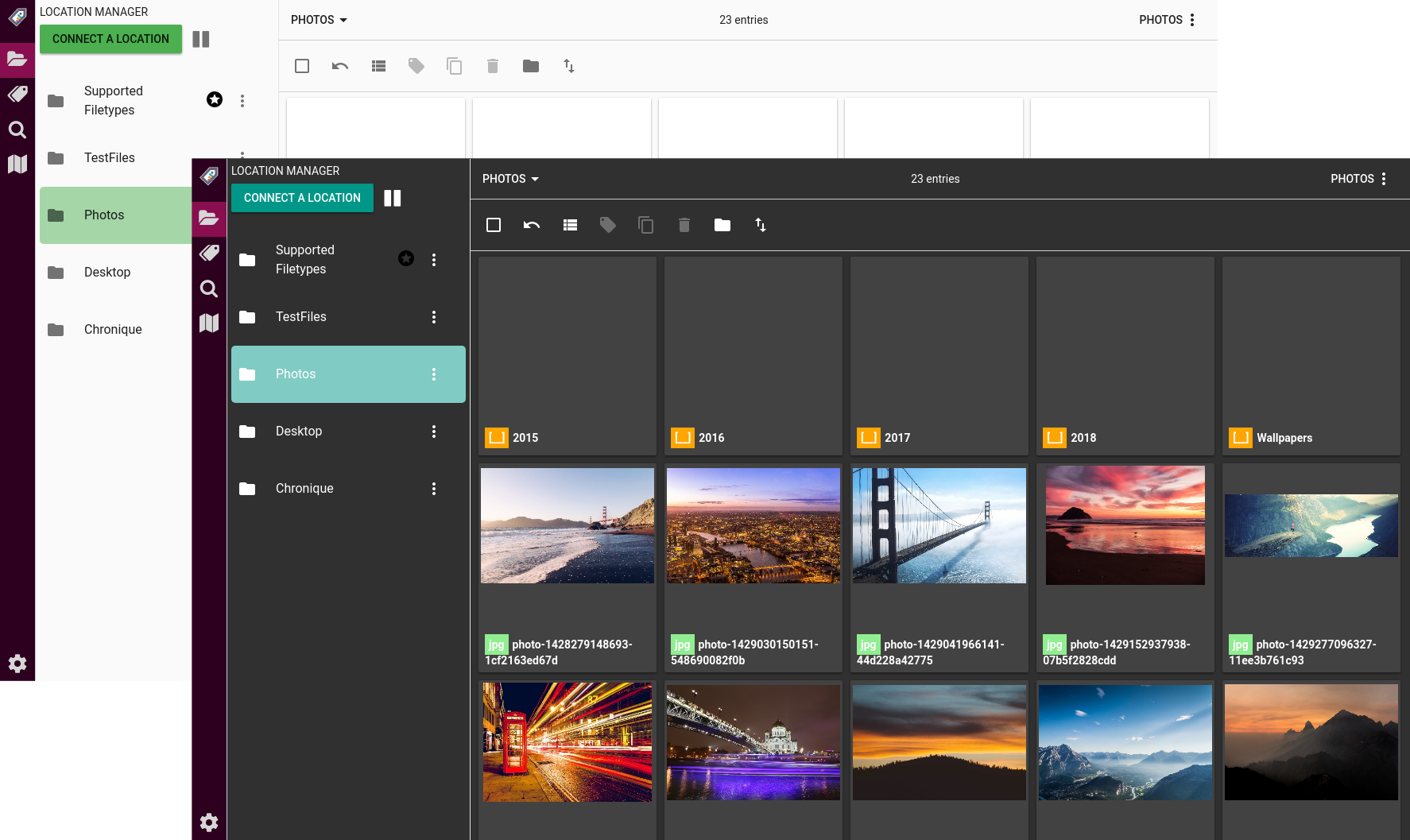TagSpaces is a open source application for managing of your local files. You can find more information about it on its website tagspaces.org. For a quick TagSpaces introduction please see this Youtube video.
- TagSpaces Blog for any news about TagSpaces
- TagSpaces Documentation for latest generated documentation of the project
- Issues Tracker for developer support requests
To get updates you can:
- Subscribe to GitHub updates by clicking the "watch" button up the top right of this page.
- Subscribe to RSS feed updates for the master branch
./app................ contains the application core
./app/locales........ contains the language files needed for the application internationalization
./app/node_modules... contains the TagSpaces extension modules
./cordova............ contains the code needed for running the Android version
./dll................ contains the file needed for live reload in development mode
./flow-typed......... contains for the Flow static type checker
./internals.......... contains files needed for supporting Flow and Eslint
./node_modules....... after yarn install, you will find here the external dependencies of the application
./resources.......... contains images and other files needed for the application building
./scripts............ contains js script needed for the yarn/npm tasks
You can find the latest release of TagSpace in the Github release section of TagSpaces
A full list of the changes is available in our changelog
- File managing & tagging: TagSpaces provides a convenient interface for browsing, viewing and tagging of your local files and folders.
- No-Cloud: TagSpaces is running completely offline and serverless on your laptop, desktop or tablet and does not require an internet connection and any kind of online registration or service provider.
- Note Taking: You can create and edit notes in plain text, markdown and html file formats
- Cross-platform: TagSpaces runs on Windows, Linux, Mac, Android and as extension for the Firefox and Chrome browsers.
The core of TagSpaces starting from version 3 is build with react.js and the great material-ui framework.
The native Windows, Linux and Mac OS versions of TagSpaces are built with Electron. Electron is an app runtime based on Chromium and node.js. In order to combine it with react we have used the electron-react-boilerplate.
In order to run TagSpaces on your Windows, Mac OS or Linux from the source code published here, you will need the following prerequisites:
Get the TagSpaces source code by cloning its repository:
$ git clone https://github.com/tagspaces/tagspaces.git
Go to the folder where the code was cloned and select the branch you want to test. Use the the master branch for the last officially released version or the branch develop for a kind of a nightly build, containing the changed we are preparing for the next release of the application.
Switch to folder where you have cloned the repository:
$ cd tagspaces
Change to the branch with the name develop:
$ git checkout develop
and install the project dependencies:
$ yarn install
The last command will automatically build the application with webpack. Now it is time to install all the TagSpaces extensions:
$ yarn install-ext
Now you are ready and can start the application with:
$ yarn start
If you want to try the development mode, you can start it by:
$ yarn dev
This will start a development server in background, which watches for changes in background and refreshes the application automatically once you have done some changes in the source code.
Building of the packages can be accomplished with the integrated yarn scripts:
$ yarn package-win
$ yarn package-linux
$ yarn package-osx
For creating the packages for Windows, Linux and Mac OS respectively.
TagSpaces can be easily extended with the help of extensions. Currently we use the extensions for supporting the opening and editing of different file types in the application. More information about this topic can be found on the extension page of our website.
The webdav version of the app can be started with the following yarn command:
$ yarn run-web
This command will start a local node.js-WebDAV server on http://127.0.0.1:8000. Open your browser and enter the following URL:
http://127.0.0.1:8000/index.html
You will be prompted for user credentials, which are username: demo and password: demo and now you should be able to work with the WebDAV version of TagSpaces.
For setting up the WebDAV version on your server, please read Self-hosted TagSpaces with WebDAV from our blogs.
TagSpaces's source code is licensed under the AGPL (GNU Affero General Public License) Version 3, for the license text see LICENSE file.
TagSpaces is an open source software and as such, the code is publicly available on GitHub, and forking is particularly recommended! Still, contribution must be done following some guidelines. Contributor License Agreement
The CLA is an agreement commonly used in major open source project, which aims at protecting all parties implied by a contribution: the contributor, the main code author, and above all, the community. The CLA model we have chosen basically tells the following: the contribution’s copyright is shared between the contributor and the main author. This means each party can do whatever she want in term of relicensing with this contributed piece of code. This is important, because, if in the future, the author wants to change the license in something more in favor of the community, a singular contributor cannot block the process.
The Contributor License Agreement can be signed online on the following CLA form.
You can help the translation of this application in your favorite languages by joining the translations teams on Transifex.
If you ideas or suggestion on how we can improve our application, you can check the following Trello board. Here you will find numerous ideas already proposed by other users. If you want to post something new, please follow this link
If you are having trouble using TagSpaces or have found a bug or you have some ideas how TagSpaces could be improved: open a ticket on GitHub.
- Subscribe to RSS feed updates for the tagspaces blog
- Subscribe to RSS feed updates for the master branch

